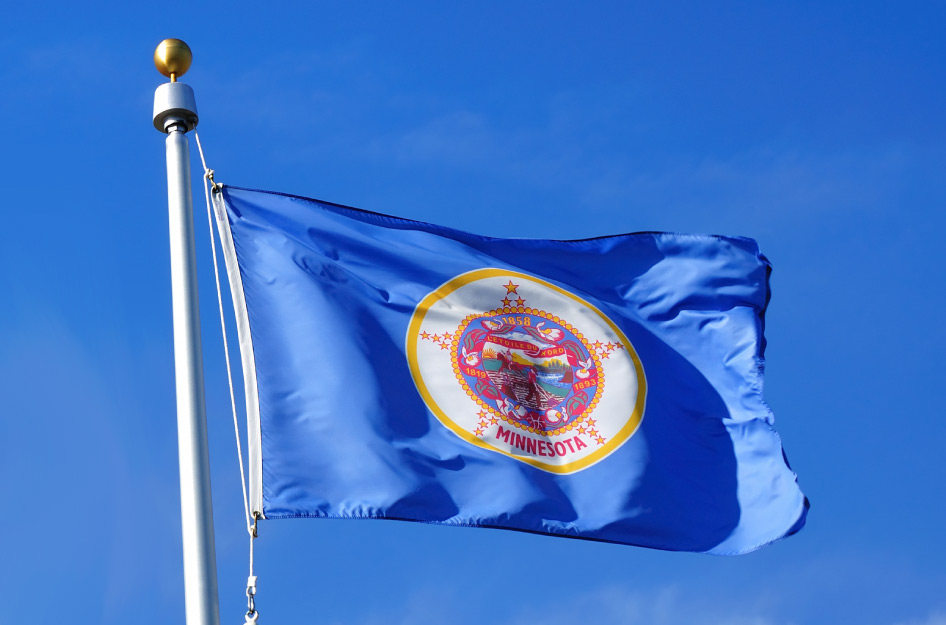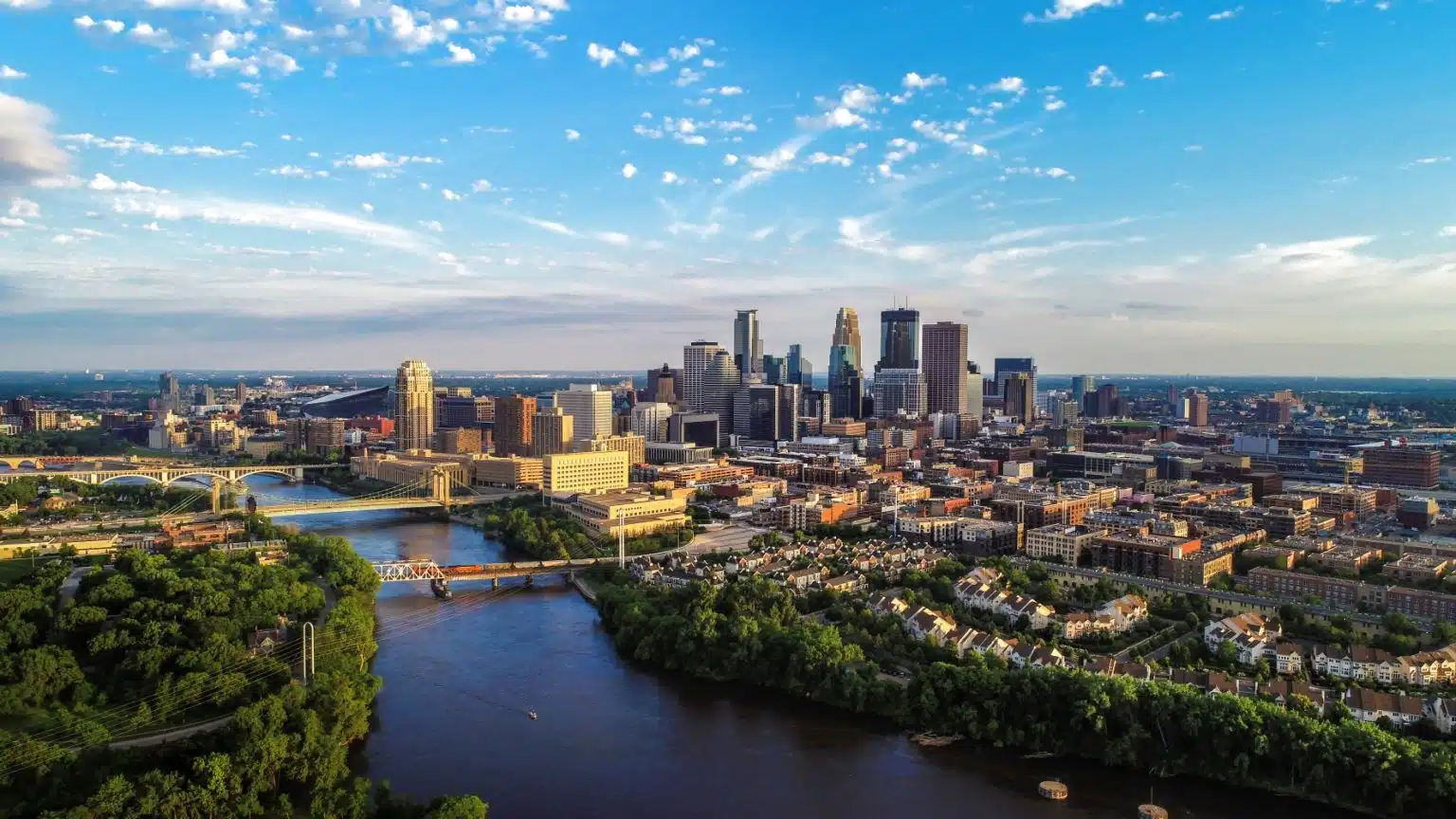8 of the Best Minneapolis Neighborhoods To Check Out If You’re Moving to the Twin Cities
MinnesotaMinneapolis
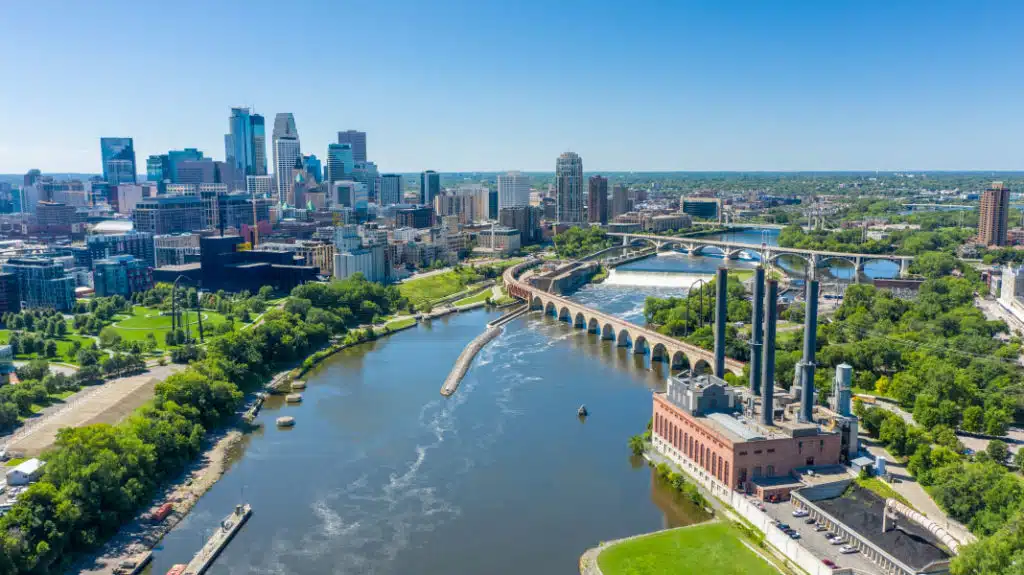
Thinking about living in Minneapolis? Then you probably know that, despite what you may have heard, the City of Lakes isn’t just one big year-round block of ice. The best neighborhoods in Minneapolis — and most of this gorgeous, green city — are full of warm people, avid sports fans, outdoor lovers, and scrumptious food. In fact, speaking of outdoor lovers, this midwestern city that straddles the mighty Mississippi River boasts more than 7,000 acres of parkland and water, including 102 miles of trails, 22 lakes, and 185 parks! Not to mention, dozens of the best Minneapolis neighborhoods to explore.
| Planning a move to Minneapolis? Start by getting a quote from PODS. |
And even though Minneapolis shares its fame with its neighboring twin city, St. Paul, it doesn’t take long to see that Minneapolis has a spark and spirit all her own. Once the city thaws out from winter — which, yes, is pretty dang long and cold (but you get used to it, we promise!) — the city sports some lovely weather, and residents truly make the most of it.
Don’t get us wrong. Just like any big city, it’s not blue skies and sunshine all the time, literally and figuratively speaking. Minnesota has a fairly high sales tax rate, and overall it struggles with a high rate of crime. Still, nearly half a million residents call Minneapolis neighborhoods home, and we’re pretty sure you’ll love it, too.
Whether you’re looking for classy or comfort foods, park time or playtime, trendy or traditional, sun or snow — you’ll find it here.
The Best Minneapolis Neighborhoods (Plus a Few in St. Paul, Just ’Cause)
Because there are more than 80 to choose from, finding the best Minneapolis neighborhoods means you’ve got your work cut out for you. Luckily, we’re here to help narrow down the contenders and point you in the right direction — toward some of the best neighborhoods in Minneapolis. Each Minneapolis neighborhood has its own personality, style, and vibe, so we’ll take a look at some of the most important elements, including type of housing, average housing costs, what the schools are like, what the people are like, and what there is to do nearby. We’ll also give you a peek at some top spots in its sister city of St. Paul, just in case anything tickles your fancy there.
To get us started, here are some helpful stats on home and rental prices to reference as we dip into each of the best neighborhoods in Minneapolis.
Minneapolis Housing Costs
The average rent for a one-bedroom apartment in Minneapolis is around $1,675 a month. And when it comes to owning a home, the average home value is a little more than $322,100, a smidge lower than last year.
St. Paul Housing Costs
In twin city St. Paul, average rent runs about $1,450 a month for a 797-square-foot apartment. The average home value, meanwhile, is around $282,100 — up 0.2 percent from last year.
National Housing Costs
The average rent in the U.S. is about $1,750 per month for a one-bedroom apartment. And as for the national average home price, it’s around $359,100.
| Q: What is the nicest suburb of Minneapolis? A: If you’re looking at Minneapolis neighborhoods slightly outside the city, check out Lauderdale, Medina, Shoreview, and Falcon Heights, which are all ranked among the best suburbs to live in the Minneapolis-St. Paul Area. |
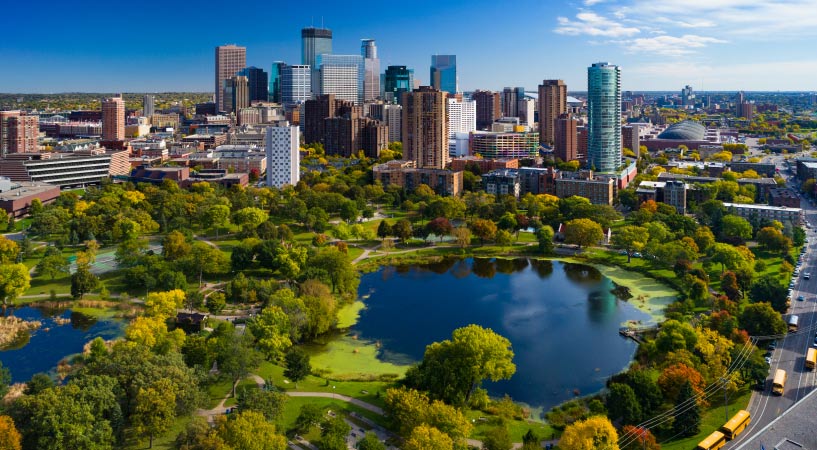
Loring Park is one of the best neighborhoods in Minneapolis for arts, culture, and affordable housing.
1. Loring Park
- Average rent (one-bedroom): $1,350
- Average home value: $191,000
- Great for: Outdoor activities, nightlife, commuting
Located on the southwestern edge of Downtown Minneapolis, Loring Park is known for hosting some of the city’s biggest festivals. It’s also home to a collection of good eats, kid- and dog-friendly areas, and cultural and historic institutions, such as The Basilica of Saint Mary and the Walker Art Center, where in addition to a world-class contemporary art collection, you’ll find the world’s largest urban sculpture park, the 11-acre Minneapolis Sculpture Garden.
As is the case in many Minneapolis neighborhoods, you can expect a good selection of condos, townhomes, and apartment buildings with amenities from outdoor pools to on-site laundry. The median home value in Loring Park is around $191,000 — which is actually down more than 25 percent from the previous year. The average rent for a one-bedroom apartment is around $1,350 per month.
This neighborhood is popular, convenient, relaxed, and affordable — a big hit with students attending the local technical college, families, young professionals, commuters, and anyone looking for a busy but relaxed spot with an enviable selection of things to do. Niche gives public schools here a solid B- grade overall, with Meadow Ridge Elementary School receiving an A+ grade.
| Q: Which part of Minneapolis is safest? A: According to NeighborhoodScout’s crime stats, the Southeast part of the city is home to some of the safest neighborhoods. Linden Hills, for instance, one of the best Minneapolis neighborhoods, is ranked No. 2 for safety, thanks to a low rate of property and violent crimes. Also from the Southeast in the top 5: Lynnhurst, East Harriet South, and Field. |

Fulton ranks as one of the best neighborhoods in Minneapolis to raise a family.
2. Fulton
- Average rent (one-bedroom): $1,350
- Average home value: $573,800
- Great for: Families, jobs, outdoor activities, nightlife, commuting
Families love Fulton! Not only does this friendly southwest neighborhood have excellent schools, but it also boasts a small-town vibe and plenty of access to green spaces, including gorgeous destinations like Lake Harriet Park and Minnehaha Creek Park. And did we mention it's also just a 20-minute drive from Downtown Minneapolis?
Home ownership is big here — and the homes are adorable. Think 1920s bungalows with tons of charm, renovated single-family homes with yards, and custom builds, as well as lots over 5,000 square feet. The average home value is just under $574,000 (up 1.5 percent from the previous year), though it's common to find price tags around $1 million closer to the lakes — and that’s the norm throughout the best Minneapolis neighborhoods. Renting in Fulton is a lot less common, though not unheard of. The average rent in Fulton is around $1,350 a month for a one-bedroom apartment.
Fulton is small and walkable and sports three main streets that are lined with cute cafés, shops, and bars. Got kids? With a rec center full of events, festivals, a wading pool, and playground, Pershing Field Park is the perfect kid-friendly place to spend a day
| Q: What is the nicest neighborhood in Minneapolis? A: Looking for nice neighborhoods in Minneapolis? Check out Fulton, which is a small and walkable neighborhood and a popular spot for families. Or head to Linden Hills, with a terrific selection of locally owned shops in one of the historic parts of Minneapolis — but easy access to Lake Harriet and lots of green space. If you’re interested in venturing beyond the best Minneapolis neighborhoods into the other Twin City, check out Macalester-Groveland, which Niche ranks as the No. 1 best neighborhood to live in St. Paul. |
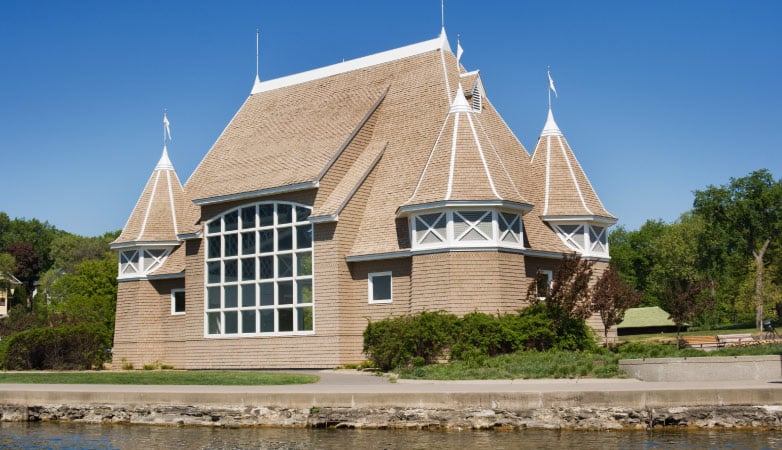
When the weather is nice, you’ll likely find Linden Hills residents renting canoes, biking and walking the three miles of dedicated paths, and soaking up the free shows at the castle-inspired Band Shell.
3. Linden Hills
- Average rent (one-bedroom): $1,850
- Average home value: $624,200
- Great for: Families, outdoor activities, nightlife, commuting
Love the outdoors and unsure where to live in Minneapolis? Linden Hills is bordered on three sides by two green parks and two tranquil lakes (Bde Maka Ska, the largest lake in Minneapolis, and Lake Harriet). This picturesque southwest Minneapolis neighborhood also has beautiful tree-lined streets (gorgeous in the fall), a vintage streetcar, independent shops and eateries, and an overall eclectic vibe boasting a small-town feel. During good weather, you’ll likely find residents renting canoes, biking and walking the three miles of dedicated paths, and soaking up free shows at the locally iconic castle-inspired Lake Harriet Bandshell.
But this high quality of life in one of the best Minneapolis neighborhoods comes at a price. Most residents in Linden Hills own their homes, and the average home value is around $624,200, more than double the average Minneapolis figure. Rent here averages $1,850 per month for a one-bedroom apartment, on par with the city-wide average. Whether you rent or buy, though, expect a good selection of housing, ranging from cute cottages and bungalows to contemporary condos and older, historic apartments.
Linden Hills is often named among the best neighborhoods to live in Minneapolis, and for families with kids, you can count on an above-average school district: Niche rates it an overall B- grade. Many families move here for the schools and variety of outdoor activities, while the neighborhood is also popular with young professionals who like the mix of shops, restaurants, bars, and access to nature.
| Q: What is the hippest neighborhood in Minneapolis? A: Trendy and upscale with a historic-industrial-chic vibe, the North Loop is home to chic boutiques, craft breweries, and dining hotspots, and has become known as one of the best neighborhoods Minneapolis has to offer. Spoon and Stable — yes, it’s built in an old stable — is a must-visit, with innovative Midwestern cuisine from the imagination of James Beard Award-winning Chef Gavin Kaysen. As for housing, the district is known for its contemporary apartments and converted warehouses — super popular among the young professionals and creative crowd that live and play here. |
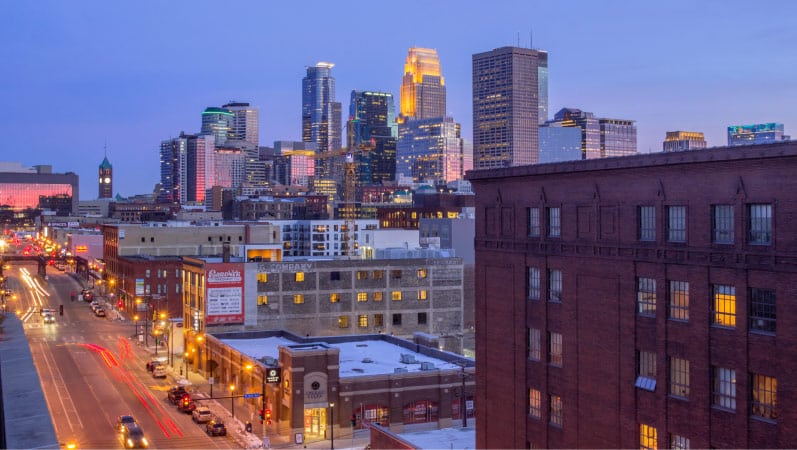
Most people rent in North Loop, where the average for a one-bedroom apartment hovers around $1,925 per month.
4. North Loop
- Average rent (one-bedroom): $1,925
- Average home value: $377,700
- Great for: Families, young professionals, outdoor activities, nightlife, commuting
The North Loop Minneapolis neighborhood (a.k.a. The Warehouse District) is a hip hotspot alongside the Mississippi River. Aptly named, this area is full of old warehouses that have been converted and renovated into office spaces and apartments. The vibe is young, creative, and industrial. North Loop is certainly one of the coolest — and best — neighborhoods in Minneapolis and is extremely popular with the young professional crowd who love the collection of trendy bars, hip eateries and boutiques, and easy, adjacent commutes into Downtown Minneapolis.
As it’s one of the best areas to live in Minneapolis for young professionals, most folks here rent, with the average rent around $1,925 for an 820-square-foot apartment. Since most of the buildings here are converted warehouses, you can expect a lot of loft options. The average home value in the area is around $377,700.
Niche gives North Loop an overall A grade, though it’s important to note that it only has average scores when it comes to schools and housing — perhaps why the neighborhood doesn't attract a whole lot of families. But that doesn’t stop residents from taking advantage of North Loop’s walkability, great access to public transit, and green spaces along the Mississippi.
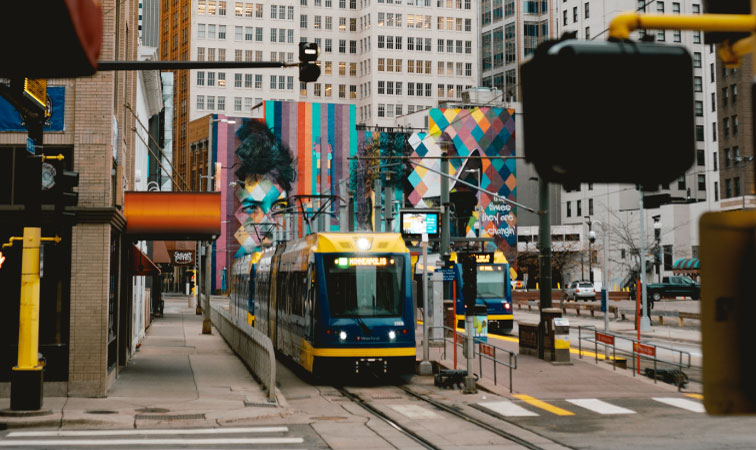
Downtown West is where you’ll want to live if you want to be right in the thick of it all — live music, snazzy restaurants, great bars, and entertainment options galore.
(Source: Weston M via Unsplash)
5. Downtown West
- Average rent (one-bedroom): $1,650
- Average home value: $218,600
- Great for: Outdoor activities, nightlife, diversity, commuting
As part of the Central Minneapolis downtown area, Downtown West is where you’ll want to live if you want to be right in the thick of it all — live music, snazzy restaurants, great bars, and entertainment options galore. Plus, thanks to the dense layout and plentiful public transportation, including the elevated Minneapolis Skyway System (key during winter), it’s perfect for pedestrians escaping other Minneapolis neighborhoods in search of some downtown fun.
You’ll find mostly young professionals occupying the high-rise apartments and condos in this vibrant, work hard/play hard (and late!) area. The average home value is around $218,600 (down 6.5 percent over the previous year), but most people here tend to rent. And while the average rent in Downtown Minneapolis is around $1,650 a month, the range is huge. Studios start at about $500 a month, and super-luxe 3-bedrooms can go for upward of $12,000 a month.
Having the city on your doorstep also means dealing with city noise, late-night shenanigans, and traffic, particularly during rush hour and sports games (which are all hosted downtown). So if a quiet environment is necessary for your peace and tranquility, perhaps look in one of the other best neighborhoods in Minneapolis to find your new home.
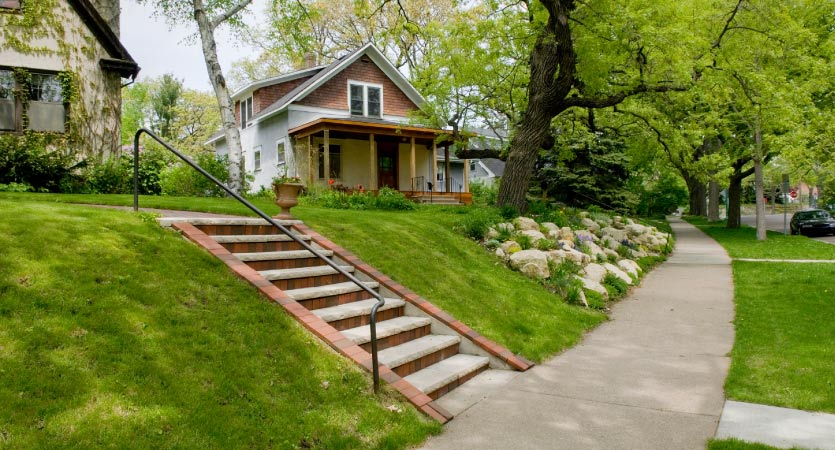
6. Macalester-Groveland (St. Paul)
- Average rent (one-bedroom): $1,375
- Average home value: $427,500
- Great for: Families, outdoor activities, safety, nightlife, commuting
If you’re not quite settled on where to live in Minneapolis, try St. Paul! And the Macalester-Groveland neighborhood is a great place to start your search. Located 15 minutes in either direction from both central Minneapolis and Downtown St. Paul, this district gives young professionals, students attending the nearby colleges, and families access to the best of both cities — without the chaos. The vibe here is quiet and suburban but not dead. There are several coffee shops, restaurants, parks, and bars to check out right in the neighborhood, and you can typically find the most action off the neighborhood's central vein of Grand Avenue.
The average home value in Mac-Groveland is about $427,500, higher than in the best Minneapolis neighborhoods and in most of St. Paul, though you’ll catch a break with rentals. Average rent here runs about $1,375 a month for a one-bedroom apartment. There are a lot of apartments for sale and rent in addition to cute 1950s single-family homes, large renovated houses with multiple bedrooms and a yard, and charming Craftsman bungalows, typically all (except the apartments) on lots over 5,000 square feet.
Niche rates Mac-Groveland as the No. 1 best neighborhood to live in St. Paul. Public schools here are rated above-average, and there are also a few colleges in the area. And given its above-average rating in crime and safety, it’s a good place to look when considering the safest neighborhoods in Minneapolis and beyond. Keep this neighborhood in mind if you’re looking for a pedestrian-friendly spot with easy access to green space (including the Mississippi River), big-city amenities, and a little slice of sweet suburban life.
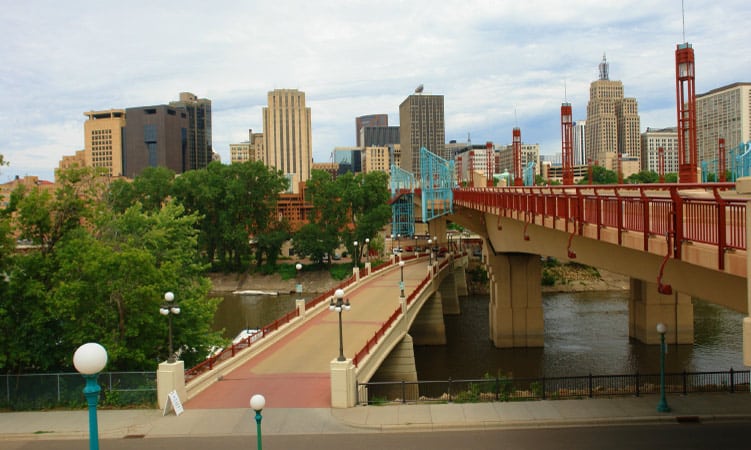
Downtown St. Paul is home to gorgeous river views, museums, and plenty of bars and restaurants, not to mention live music and performance venues like the Palace Theatre.
7. Downtown (St. Paul)
- Average rent (one-bedroom): $1,625
- Average home value: $200,100
- Great for: Families, safety, nightlife, diversity
This second heart of the Twin Cities proves life beats just as strong on the east side of the river. Some of the biggest bonuses to Downtown St. Paul? It’s dense, walkable, safe, full of character, and, quite often, the life of the party. Most people who live here are young professionals or students who want to soak up the energy and get around on foot or by bike.
The majority of people who live here rent and live in large apartment complexes or in renovated loft spaces. Average rent runs just over $1,600, with 73 percent of rentals going for between $1,000 and $2,000 a month, and 19 percent costing more than that. And most rentals have good amenities such as laundry, fitness centers, and on-site management. The average home value is around $200,100, and you’ll find mostly lofts and condos on the market.
Trying to decide between Central/Downtown Minneapolis neighborhoods and Downtown St. Paul? The safety of Downtown St. Paul just might tip the scales. Well, that plus the gorgeous river views, museums, live music and performance venues like the Palace Theatre, bars, restaurants, and a good amount of green space. Can’t miss: Anchored by a visitors center in Downtown St. Paul’s Science Museum of Minnesota, the Mississippi National River & Recreation Area stretches for 72 miles beyond downtown, with fishing, boating, hiking, and biking — and information hubs and museums along the way.
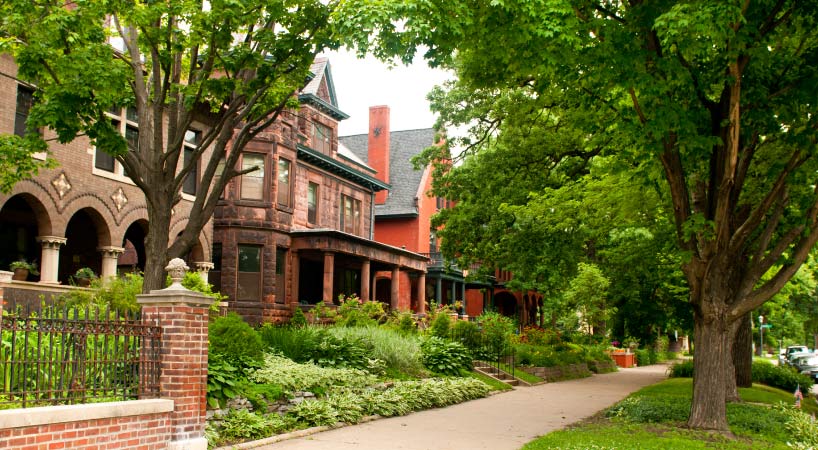
Summit Hill is one of the oldest neighborhoods in St. Paul, known for its well-kept Gilded-Age and Victorian mansions.Summit Hill is one of the oldest neighborhoods in St. Paul, known for its well-kept Gilded-Age and Victorian mansions.
8. Summit Hill (St. Paul)
- Average rent (one-bedroom): $1,575
- Average home value: $526,200
- Great for: Families, outdoor activities, safety, nightlife, commuting
Love history? Head to Summit Hill — one of the oldest neighborhoods in St. Paul — where you’ll find as much history as beauty in the area’s well-kept Gilded Age and Victorian mansions (including F. Scott Fitzgerald’s house!). This affluent neighborhood gives a taste of the high life with European-style bakeries, luxury boutiques, and upscale restaurants.
While big homes with big price tags are the norm here, you’ll also find sprinklings of smaller single-family homes and contemporary condos with somewhat more affordable prices. And public schools here have an overall A- rating from Niche, which plays a part in its ranking as the second-best neighborhood to raise a family in St. Paul. The average home value is just over $526,200, while average rent runs about $1,575 a month for a one-bedroom apartment.
Shop ’til you drop on Grand Ave, eat your way down Selby Avenue, or just go for a stroll to admire the historic architecture (like the beautiful Blair Arcade built in 1887) lining the streets of this pedestrian-friendly neighborhood. And be sure to check out Keg and Case, a just-opened market hall with cafes and boutiques in the refurbished space of an old brewery.
Looking for a few more options on that vast Minneapolis neighborhoods map? Take a look at these.
|

Planning a move to one of these Minneapolis neighborhoods? Choose a flexible moving and storage service like PODS that will allow you to pack, load, and move at your own pace.
Planning Your Move to One of the Best Neighborhoods in Minneapolis
Hopefully this guide to Minneapolis neighborhoods has pointed you in the right direction (that is, toward some of the best neighborhoods in the Twin Cities)! From local moves to relocations across the country, when it’s time to make the move to Minneapolis, a flexible moving and storage service like PODS will allow you to pack, load, and move at your own pace — and from your own driveway.
Until then, check out the PODS Blog for tips and tricks to help you start planning your move. We’ve got all the goods — from this handy apartment moving checklist to how to get accurate moving cost estimates to stuff you should know about renting portable storage containers. Basically, we’re here for you — every step of the way.
Alex Keight is a frequent contributor to the PODS Blog who has moved 25+ times because she loves to experience new places.
Editor’s note: Average and median rent prices were obtained from RentCafe, Niche, and Apartment.com; average and median home values were obtained from Zillow and Niche; and median home sale prices were obtained from Redfin. For ease of reading, monthly rental prices were rounded to the nearest $25 and home values were rounded to the nearest $100.

Your quote in 60 seconds
Get pricing tailored to your needs!
